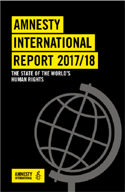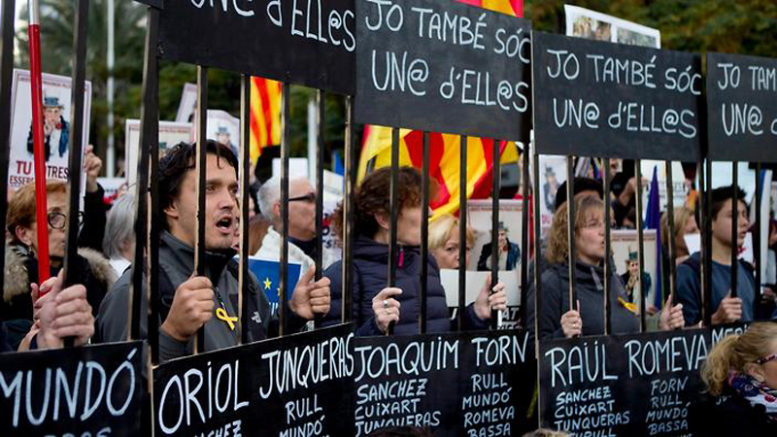► Jailed Catalan leaders not considered ‘political prisoners’ by Amnesty Intn’l►
The president of the executive committee of Catalonia’s Parlament, Rogert Torrent, sparked a walkout Friday of nearly three dozen of Catalonia’s leading judges and attorneys when in a speech before the Barcelona bar association (ICAB) he explicitly referred to the jailed leaders of Catalonia’s pro-independence movement as “political prisoners” detained in preventive custody for “crimes that do not exist”.
Torrent, a deputy in the Catalan Parlament of the pro-independence Esquerra Republicana de Catalunya (ERC) party, reportedly had agreed previously with the bar association that he would not use the charged term “political prisoners” in his speech.
Currently, four leaders of the movement that staged last October’s unconstitutional independence referendum in Catalonia and a subsequent declaration of independence from Spain are being held in preventive custody on the orders of Supreme Court Judge Pablo Llarena. They are: former Catalan regional vice-president Oriol Junqueras, former Interior Minister Joaquim Forn, Jordi Sánchez and Jordi Cuixart, the latter two leaders of the pro-independence associations Asamblea Nacional Catalana (ANC) and Òmnium Cultural, respectively.
► Download PDF in English of full Amnesty International Report 2017/18 …
So far, prosecutors have charged these four and some 20 others with the crimes of rebellion, sedition and misuse of public funds in relation to the referendum and subsequent independence declaration. After hearing initial depositions from most of the accused, Judge Llarena has released all but four on bail or on their own recognizance, but opted to remand Junqueras, Forn, Sánchez and Cuixart into preventive custody while awaiting trial, saying he believed there is a likelihood that upon release they would again commit the same or similar crimes of which they have been accused.
Torrent’s speech last week aired the same question raised repeatedly since October by a concerted international campaign using the symbol of a yellow ribbon to designate the four leaders as political prisoners. Are they actually “political prisoners” who have been detained for their ideas? Or, have they been charged and detained because they were engaged in activities that violated Spanish law.
What Amnesty International has to say about this question is instructive:
 In its Amnesty International Report 2017/18 last week, the human-rights organization says only that the two are “charged with sedition, a broadly defined offence, in connection with protests they organized in Barcelona on 20 and 21 September to, according to a judge, oppose a lawful police operation”; the report also notes that the charges were broadened to include rebellion when the case moved to the Supreme Court’s jurisdiction. Nowhere in the annual report does Amnesty refer to Sánchez, Cuixart or the other two held in custody as “political prisoners” nor does it use Amnesty’s customary term of “prisoners of conscience” for such cases.
In its Amnesty International Report 2017/18 last week, the human-rights organization says only that the two are “charged with sedition, a broadly defined offence, in connection with protests they organized in Barcelona on 20 and 21 September to, according to a judge, oppose a lawful police operation”; the report also notes that the charges were broadened to include rebellion when the case moved to the Supreme Court’s jurisdiction. Nowhere in the annual report does Amnesty refer to Sánchez, Cuixart or the other two held in custody as “political prisoners” nor does it use Amnesty’s customary term of “prisoners of conscience” for such cases.
In an early February statement, Amnesty International Europe director Gauri van Gulik tacitly admitted that Judge Llarena may have evidence indicating Sánchez and Cuixart were involved in obstruction of justice during a 20th September protest they directed to stop police searches of Catalan government offices on the orders of a Barcelona judge, but said such a charge “does not constitute a serious crime such as sedition or rebellion”. Llarena’s failure to honor Sánchez’s request for release on bail could therefore be considered “excessive and disproportionate,” van Gulik said. But, she refrained from referring to either of the two men as “political prisoners” or “prisoners of conscience”.
Although van Gulik’s comments evidence a growing impatience among some in Amnesty International over the Catalan independence leaders’ situation, neither her statement nor the annual Amnesty Report 2017/18 contradict the position laid out in November by a spokesperson for Amnesty International Spain.
Clarifying to Spanish news media that Amnesty does not use the term “political prisoners”, which has no internationally recognized definition, the Amnesty Spain spokesperson said that based on the internationally accepted definition of the term “prisoners of conscience” used for those jailed solely for their convictions or ideas, with the current information available regarding the charges against the four Catalan independence leaders in preventive custody and others since released on bail on the same charges, Amnesty International does not consider them to be “prisoners of conscience”.
► Read More in Spanish at El Periódico, La Vanguardia and Europa Press …
► Download PDF in English of full Amnesty International Report 2017/18 …


